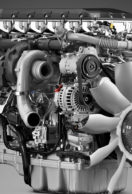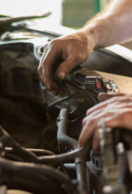You've heard people say that they're taking their car to the mechanic before going on a road trip, to give it a "tune-up." Have you ever wondered just what that actually means and when you should get one?
Tune-Ups Past and Present
Decades ago, an engine tune-up involved getting under the hood and adjusting a bunch of things to get the engine running like new again. However, modern vehicles aren't made in the same way as they used to be, so there aren't nearly as many things that you can "tune up." From ignition timing to the fuel mixture, most of the car's functions are operated through the engine computer.
However, despite the more or less out-dated nature of the term, many drivers still get tune-ups regularly, and they still can be beneficial. Most drivers go to get a tune-up these days when they start to notice that something doesn't feel quite right anymore--perhaps the vehicle is getting hard to start, making knocking noises, or failed an emissions test.
Some people think a tune-up today is just about changing spark plugs. However, in any of these circumstances with driveability issues, a good mechanic would do an engine performance analysis to determine the root of the problem that will need to be fixed.
 These days, they won't just get under the hood and start tightening and loosening things. The complex electronic and mechanical systems that cars use require more complex diagnostics and sometimes more complex fixes. Sure, sometimes it is just a spark plug problem, but without diagnosing the problem in the first place, this "quick fix tune-up" will just be a waste of time and money.
These days, they won't just get under the hood and start tightening and loosening things. The complex electronic and mechanical systems that cars use require more complex diagnostics and sometimes more complex fixes. Sure, sometimes it is just a spark plug problem, but without diagnosing the problem in the first place, this "quick fix tune-up" will just be a waste of time and money.
Common Sense Tune-Up Tests
Here are some basic check-ups that should be included with a tune-up today.
- Scan for fault codes, so that they can be diagnosed and eliminated.
- Check exhaust emissions to be sure they are up to clean air standards, if applicable.
- Check battery voltage.
- Check power balance or dynamic compression to identify any mechanical problems that could be problematic for engine performance.
- Engine vacuum check to ensure that the system is closed and no leaks are present.
- Check idle speed.
- Check ignition timing.
- Visually inspect hoses and belts.
- Check fluid levels and purity (oil, coolant, automatic transmission, power steering, and brake fluids).
Typical Tune-Up Replacements
If no significant and urgent problems are found in the check-up stage, a tune-up will generally include replacement of some common maintenance items.
- Replace spark plugs
- Swap out filters (air filter, fuel filter, PCV valve and breather filter).
- Replace O2 sensor, if needed (recommended every 100,000 miles in most newer vehicles).
On older vehicles, a tune-up may also include adjusting ignition timing, idle speed, and idle mixture, but these are generally computer-controlled in modern cars.
Tune-ups, whatever you decide to call them, are still a good idea, especially when you notice issues in your vehicle's driveability or are about to go on a long road-trip. Just be sure to take your vehicle to All in the Wrist Auto and Diesel Repair to get complete, responsible maintenance--not just new spark plugs.








